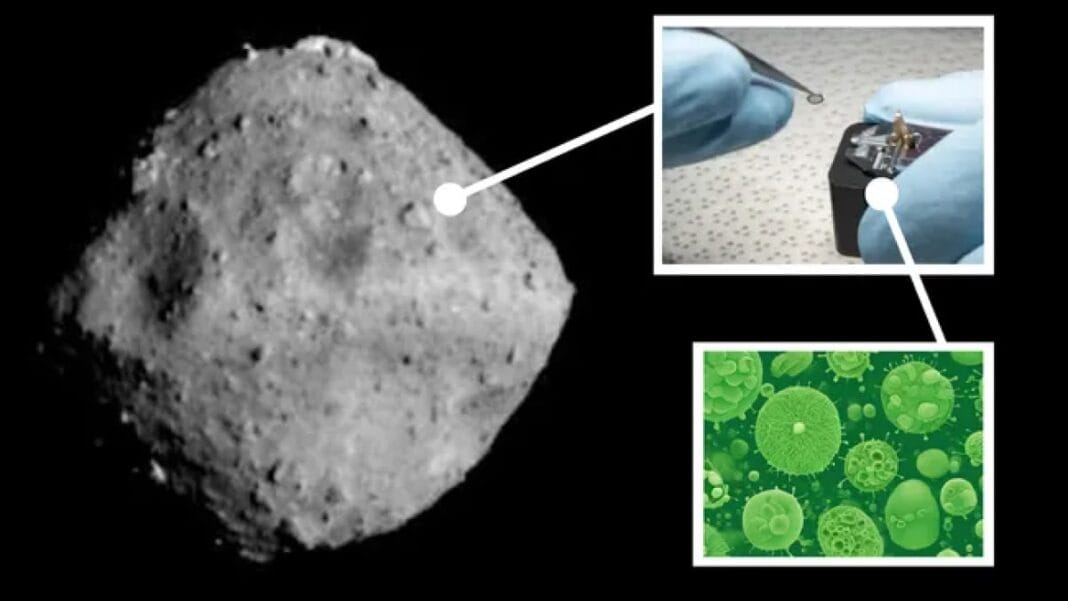Terrestrial Microorganisms Discovered in Asteroid Sample – A Comprehensive Review
Exploring the depths of the universe has always been an intriguing endeavor for scientists and space enthusiasts alike. The recent discovery of terrestrial micro-organisms in a sample returned from asteroid Ryugu by Japan’s Hayabusa2 mission has sparked a new wave of interest in the scientific community. This groundbreaking finding sheds light on the resilience of Earth-based life forms and the challenges of maintaining uncontaminated extraterrestrial samples for analysis.
Microbial Growth Observed on Asteroid Sample
A study published in Meteoritics & Planetary Science revealed the presence of micro-organisms on an asteroid fragment brought back by the Hayabusa2 mission. Dr. Matthew Genge, a planetary scientist at Imperial College London, confirmed the discovery of rod- and filament-shaped structures resembling bacteria on the rock. These microbes were identified as Earth-based, having colonized the sample only after exposure to Earth’s atmosphere.
Initially, the sample showed no signs of biological presence during tests using nano-X-ray computed tomography. However, after being exposed to Earth’s environment, the microbial population increased from 11 to 147 within a week. This rapid colonisation highlighted the resilient nature of Earth’s microbes in adapting to foreign materials.
Implications for Space Exploration
The study’s findings have significant implications for future space exploration missions. Dr. Genge emphasized the risks posed by terrestrial contamination to planetary exploration efforts. The ability of Earth-based microorganisms to survive on extraterrestrial materials could complicate the detection of alien life on other planets.
The research underscores the importance of implementing rigorous planetary protection protocols to minimize biological contamination in extraterrestrial environments. Scientists are now planning further investigations of samples from Ryugu and asteroid Bennu to mitigate the contamination risks observed in this study.
Conclusion
In conclusion, the discovery of terrestrial micro-organisms on an asteroid sample highlights the complex challenges faced in studying extraterrestrial materials. As we continue to explore the vast reaches of space, it becomes crucial to safeguard the integrity of scientific analyses by implementing robust contamination control measures.
FAQs
1. What was the recent discovery related to asteroid Ryugu?
A study reported the presence of terrestrial micro-organisms in a sample returned from asteroid Ryugu by Japan’s Hayabusa2 mission.
2. Who confirmed the presence of micro-organisms on the asteroid fragment?
Dr. Matthew Genge, a planetary scientist at Imperial College London, confirmed the discovery of microbial growth on the rock.
3. Were the microbes found on the asteroid extraterrestrial in origin?
No, the microbes were identified as Earth-based, having colonized the sample after exposure to Earth’s atmosphere.
4. How did the microbial population on the sample increase rapidly?
The microbial population increased from 11 to 147 within a week, showcasing the adaptability and resilience of Earth’s microbes in foreign environments.
5. What are the implications of terrestrial contamination for space exploration?
Terrestrial contamination poses risks to planetary exploration missions and could complicate the search for alien life on other planets.
6. What measures are being taken to mitigate contamination risks in future missions?
Scientists are planning further investigations of samples from Ryugu and asteroid Bennu to address the contamination risks observed in the study.
7. Why is it essential to implement planetary protection protocols?
Planetary protection protocols are necessary to minimize biological contamination in extraterrestrial environments and ensure the integrity of scientific analyses.
8. How can the discovery of terrestrial micro-organisms impact future space exploration?
The discovery highlights the challenges of studying extraterrestrial materials and emphasizes the need for stringent contamination control measures in future missions.
9. What role do Earth-based microbes play in colonizing foreign materials?
Earth-based microbes demonstrate their adaptability by colonizing foreign materials such as asteroids, showcasing their resilience in diverse environments.
10. What future research initiatives are being planned in light of this discovery?
Further investigations of Ryugu samples and material from asteroid Bennu are in the pipeline to understand and mitigate the contamination risks associated with terrestrial microorganisms.
Tags
Space Exploration, Asteroid Ryugu, Microbial Colonization, Planetary Protection, Extraterrestrial Life

